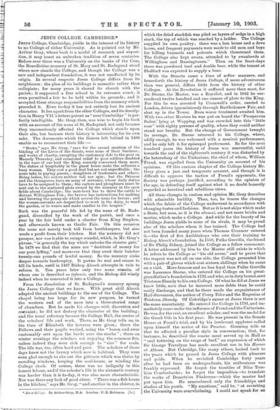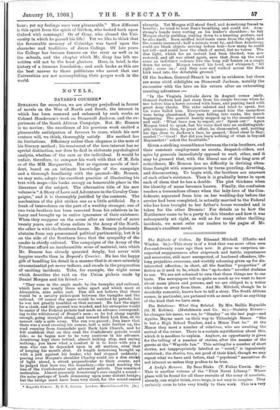JESUS COLLEGE. CAMBRIDGE.* Jesus College, Cambridge, yields in the interest
of its history to no College of either University. As is pointed out by Mr. Arthur Gray, whose book is a model of research and exposi- tion, it may boast an unbroken tradition of seven centuries. Before ever there was a University on the banks of the Cam, the Benedictine nunnery of St. Mary and St. Radegund stood
where now stands the College, and though the College was a new and independent foundation, it was not unaffected by its
origin. In several respects Jesus College differs from its neighbours : the plan of its buildings is monastic rather than collegiate; for many years it shared its church with the parish ; it supported a free school in its entrance court; it even permitted a fair to be held within its grounds ; and it accepted these strange responsibilities from the nunnery which preceded it. Even to-day it has not entirely lost its ancient
ch'aracter. It lies apart from the other Colleges, and its descrip- tion in Henry VII.'s letters patent as " near Cambridge " is per- fectly intelligible. Mr. Gray, then, was wise to begin his book
with an account of the nuns of St. Radegund, not only because they unconsciously affected the College which stands upon their site, but because their history is interesting for its own sake. The documents which the Sisters left behind in 1496 enable us to reconstruct their life :—
" Books," says Mr. Gray, "save for the casual mention of the binding of the Lives of the Saints, were none of their business ; and works of charity, excepting the customary dole to the poor on Maundy Thursday, and occasional relief to poor soldiers disabled in the wars of our lord the King, scarcely concerned them more. The duties of hospitality in the guest house make the cellaress a busy woman. They cost a good deal but are not unprofitable ; the nuns take in paying guests,—daughters of tradesmen and others. Being ladies, the sisters neither toil nor spin ; but the Prioress and the Grangeress have an army of servants, whose daily duties have to be assigned to them; the carters and ploughmen must be sent out to the scattered plots owned by the nunnery in the open fields about Cambridge ; the neat-herd has to drive the cattle to distant Willingham Fen ; the brewer has instructions for malting and brewing the penny ale which served the nuns for bevers ; and the women-servants are despatched to work in the dairy, to weed the garden, or to weave and make candles in the hospice."
Such was the peaceful life led by the nuns of St. Rade- gund, diversified by the work of the parish, and once a
year by the fair held under a charter from King Stephen, and afterwards known as Garlic Fair. On this occasion
the nuns not merely took toll from boothkeepers, but also made a profit from their kitchen. But the nunnery did not prosper, nor was it able to escape scandal, which, in Mr. Gray's phrase, "is generally the key which unlocks the cloister gate."
In 1478 we find that the nuns are " destitute of money for our pore lyffing," and moreover that they owed their butcher twenty-one pounds of lawful money. So the nunnery sinks deeper towards bankruptcy. It pawns its seal and ceases to till its lands, until in 1487 Bishop Alcock attempts in vain to reform it. Ten years later only two nuns remain, of
whom one is described as infainis, and the Bishop did wisely indeed when he converted it into a College.
From the dissolution of St. Radegund's nunnery sprang the Jesus College that we know. With great skill Alcock adapted the ancient buildings to the use of the College. The chapel being too large for its new purpose, he turned the western end of the nave into a three-storied range of chambers. But he made his changes with discretion and restraint ; he did not destroy the character of the building ; and the nuns' refectory became the College Hall, the centre of the scholars' life and work. There, as Mr. Gray tells us, in the time of Elizabeth the lectures were given ; there the Fellows and their pupils washed, using the " bason. and ewer customably sett upon the horde over the stocks " ; there on winter evenings the scholars sat enjoying the common fire, unless indeed they were rich enough to " size " for coals. The life was, too, often hard and poor. The scholars of those days knew not the luxury which now is habitual. They were even glad enough to eke out the pittance which was theirs by mending windows, keeping the coal-house, or winding the College clock. Of course, there was no indignity in this honest, labour, and if the scholar's life in the sixteenth century
was harder than it is to-day, it was also more characteristic. Nor was there any lack of good cheer. " There was a fish house in the kitchen," says Mr. Gray, " and another in the cloister, in • Jtaus CoNege. By Arthur Gray, M.A. London : F. E. Robiusou. [55.] which the dried stockfish was piled on layers of sedge in a high stack, the top of which was reached by a ladder. The College
supplied its own poultry; there was a hen house and a dove house, and frequent payments were made to old men and boys for killing buzzards and polecats which threatened them.
The College also kept swans, attended to by swanherds at Willingham and Bassingbourn." Then on the feast-days there was powdered beef and double beer, while the tenant at Shelford was expected to supply a boar.
With the Stuarts came a time of softer manners, and henceforth the history of Jesus College, if more adventurous than was general, differs little from the history of other Colleges. At the Revolution it suffered more than most, for
Dr. Sterne, the Master, was a Royalist, and in 1642 he sur- rendered twelve hundred and one ounces of plate to the King.
For this he was arrested by Cromwell's order, carried to London, driven ignominiously through Bartholomew Fair, and shut up in the Tower. Even worse treatment awaited him. With two other Masters he was put on board the 'Prosperous Sailor,' lying at Wapping, and was crowded into this " little ease" with eighty persons of quality, where they could neither stand nor breathe. But the change of Government brought its revenge. Dr. Sterne returned to his College, where, oddly enough, he was welcomed with a musical performance, and he only left it for episcopal preferment. So for the next hundred years the history of Jesus was uneventful, until towards the end of the eighteenth century it was disturbed by the heterodoxy of the Unitarians, the chief of whom, William Freud, was expelled from the University on account of his opinions. Of this curious chapter of the College history Mr.
Gray gives a just and temperate account, and though it is difficult to approve the tactics of Frend's opponents, the Society was perhaps justified, according to the opinion of the age, in defending itself against what it no doubt honestly regarded as heretical and rebellious views.
All these changes in custom and opinion Mr. Gray describes with admirable lucidity. Thus, too, he traces the changes which the fabric of the College underwent in accordance with changing tastes and fashions. But as it is not ships which make
a State, but men, so it is the alumni, and not mere bricks and mortar, which make a College. And while for the beauty of its
buildings Jesus yields to none of its rivals, it may be proud also of the scholars whom it has trained. The College had not been founded many years when Thomas Cranmer entered it, the first of five Archbishops who owe their training to Bishop Alcock's foundation. In 1568, Fulke Greville, the friend of Sir Philip Sidney, joined the College as a fellow commoner.
A letter addressed by him to the Master still exists in which he refers to the College as " his old nurse," and to prove that the respect was not all on one side, the College presented him with a pair of gloves which cost sixteen shillings when he came on a visit. More famous and no less loyal than Fulke Greville was Laurence Sterne, who entered the College on his great- grandfather's foundation in 1733, and who, as in duty bound, sent Tristram Shandy to his own College. Of what he did at Jesus we know little, save that he incurred more debts than he could easily discharge, and that he there made the acquaintance of
Hall-Stevenson, the author of Crazy Tales and the Eugenius of Tristram Shandy. Of Coleridge's career at Jesus there is not
the same uncertainty. He entered the College in 1791, and im- mediately came under the influence of Freud and the Unitarians. He was, for the rest, an excellent scholar, and won the medal for the Greek Ode in his first year. He was present in the Senate House at Freud's trial, and by his irrelevant applause called upon himself the notice of the Proctor. Gunning telli us that he affected a peculiar style in conversation; that, for instance, he described the coarse meat served up in Hall as " veal tottering on the verge of beef," an expression of which
Sir George Trevelyan has made excellent use in his Horace at Athens. But Coleridge, like many others, looked back to the years which he passed in Jesus College with pleasure
and pride. When he revisited Cambridge forty years after he had been an undergraduate, his enthusiasm was frankly expressed. He forgot the troubles of Silas Tom-
kins Comberbacke ; he forgot the imposition—to translate the works of Demetrius .Phalereus—which the master had put upon him. He remembered only the friendships and studies of his youth. "My emotions," said he, " at revisiting the University were overwhelming. I could not speak for an
hour; yet my feelings were very pleasurable." How different is this spirit from the spirit of Gibbon, who looked back upon Oxford with contempt ! Or of Gray, who abused the Uni- versity in which be passed his life ! Yet we like to think that the favourable memory of Coleridge was based upon the character and traditions of Jesus College. Of late years the College has become famous on the river as well as in the schools, and the chapter which Mr. Gray has left un- written will not be the least glorious. Here, in brief, is the history of a humane foundatidn ; and such books as this are the best answer to those politicians who assert that our Universities are not accomplishing their proper work in the world.







































 Previous page
Previous page